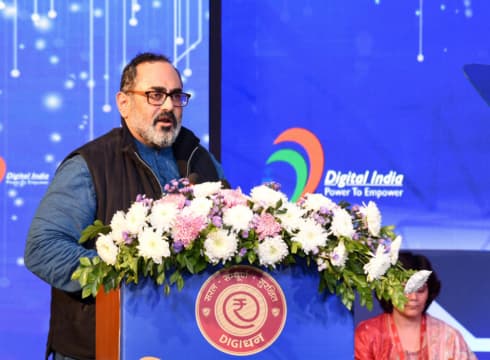NDGFP aims to standardise government's data collection and management while catalysing AI and data-led research and startup ecosystem: Chandrasekhar
The minister took part in a stakeholder interaction on the draft National Data Governance Framework Policy in New Delhi
The draft policy was published on May 26 and will be open for public feedback till June 18
Inc42 Daily Brief
Stay Ahead With Daily News & Analysis on India’s Tech & Startup Economy
Minister of State (MoS) for Electronics & Information Technology Rajeev Chandrasekhar on Thursday (June 16) chaired a stakeholder interaction on the draft National Data Governance Framework Policy (NDGFP).
The session, which was held in New Delhi, saw participation of more than 250 stakeholders from startups, academia, industry, think tanks and government officials from various ministries.
“…government’s vision is to build a modern framework for data governance that will be a kinetic enabler of India’s digital economy. NDGFP aims at standardising government’s data collection and management while catalysing AI and data led research and startup ecosystem,” said Chandrasekhar.
The MoS also called for ensuring a collaborative and participative approach towards the policy and its implementation. The stakeholders gave suggestions to the government on a slew of issues including continuation of dialogue regarding the functioning of India Data Management Office (IDMO) and access to datasets for private players.
The draft policy was published on May 26 and will be open for public feedback till June 18. It aims to ‘modernise’ the institutional framework for data collection by the government. It also aims to catalyse the AI-led startup ecosystem in the country by creating a repository of India-specific non-personal datasets for usage by private players.
What Does The Framework Entail?
The new draft bill envisages setting up of IDMO, on the lines of the US Federal Data Management Office. The IDMO will likely be responsible for setting all standards and guidelines going forward on all aspects of data, which includes storage and anonymisation, the MoS had said previously.
As per the draft, all ministries will have data management units (DMUs) that will be headed by a Chief Data Officer, and will also be responsible for the implementation of the data governance policy.
The policy also seeks to ‘encourage’ private companies to share non-personal data with startups as part of the effort. The new framework has also skipped the contentious clause that allowed the sale of data collected by the government in the open market.
Earlier in February, the Centre released the draft India Data Accessibility and Use Policy 2022. However, it was panned by internet activists and civil society members over its bid to monetise non-personal data gathered from citizens.
Under fire, the government later rescinded the policy and unveiled the new framework in May this year under the new name, NDGFP.
Earlier this month, Tata Sons Chairman N Chandrasekaran called for promulgating a new Digital India Act, saying that a lot has changed in the technology landscape since the original IT Act was promulgated decades ago.
{{#name}}{{name}}{{/name}}{{^name}}-{{/name}}
{{#description}}{{description}}...{{/description}}{{^description}}-{{/description}}
Note: We at Inc42 take our ethics very seriously. More information about it can be found here.


